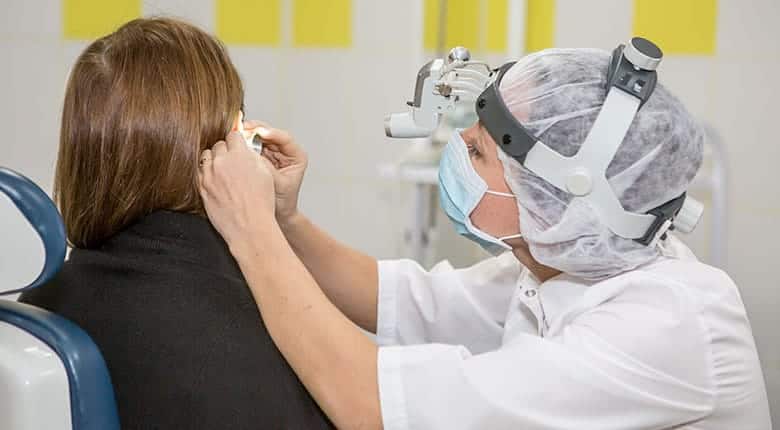Tinnitus is a common condition that affects many people in Perth and throughout Australia.
With an estimated 2 out of 3 people suffering from tinnitus at some point in their life, this condition poses serious challenges for individuals and their families.
Characterised by a ringing, buzzing, or whistling sound in the ears that can be heard by the person experiencing it (but without external sound), tinnitus can be temporary or chronic. Regardless of the severity of the condition, tinnitus can range from a minor annoyance to a debilitating condition that affects a person’s quality of life.
Read on for support and resources to help you, or a loved one, manage this debilitating condition.
Looking to learn more about tinnitus and what steps you can take after a diagnosis?
6 Common causes of Tinnitus
The causes of tinnitus are varied and can include exposure to loud noise, ear infections, head injuries, certain medications, age-related hearing loss, Meniere’s disease, blockage in the ear, temporomandibular joint disorder, certain medical conditions, and lifestyle factors.
If those feel like a lot of possible causes… it’s because they are.
Thankfully, there are a range of treatment options to ensure tinnitus does not negatively impact the quality of your life, or the life of a loved one. Below, we’ll break down some of the risk factors to watch out for that may contribute to hearing damage.
We’ll also discuss the different treatment options available to manage tinnitus and improve the quality of life of those affected by this condition.
#1 – Exposure to loud noise
One of the most common causes of tinnitus is exposure to loud noise. However, your definition of “loud” may not align with the type of sounds that can cause damage. Noise over 85 decibels is enough to cause damage to your hearing. For example, noise generated by construction sites, traffic, and music venues can all deliver higher decibel counts and may be contributing factors.
#2 – Ear infections
Ear infections can cause inflammation and swelling in the ear, which can result in tinnitus symptoms. Additionally, ear infections can also cause fluid buildup in the ear, which may represent another trigger.
#3 – Head injuries
A head injury can damage the delicate inner ear, leading to tinnitus. In addition, a head injury can also cause problems with the brain’s ability to process sound. If you experience hearing loss or damage after an injury, please consult a medical professional.
#4 – Medications
Some medications, such as antibiotics and cancer drugs, have been recorded as causing tinnitus as a side effect. Other medications, such as aspirin and ibuprofen, can also become risk factors if taken in large doses or for a long time.
#5 – Underlying medical conditions
Underlying medical conditions such as hypertension, high blood pressure, cardiovascular disease, and diabetes may exacerbate tinnitus. These conditions can cause changes in blood flow to the ear and can damage the blood vessels in the ear.
#6 – Idiopathic Tinnitus
In some cases, the cause of tinnitus may be unknown. This is known as idiopathic tinnitus.
| 💡 Is Tinnitus Dangerous? When your ears are exposed to loud noise, damage can occur to the tiny hair cells in the inner ear that help to transmit sound to the brain. Once these hair cells are damaged, they cannot be repaired or replaced, and tinnitus can develop. Although not a long-term health risk, hearing challenges or constant ringing can contribute to anxiety, depression, and other psychological challenges. |
Tinnitus diagnosis and treatment
If you are experiencing tinnitus, it is important to see an audiologist or an ear, nose and throat (ENT) specialist for a proper diagnosis. This simple step can help determine the underlying cause of your tinnitus and an appropriate treatment.
Treatment options for tinnitus may include sound therapy, cognitive-behavioural therapy, and medications.
- Sound therapy involves using background noise, such as white noise or nature sounds, to mask the ringing in the ears.
- Cognitive-behavioural therapy can help to change the way that you think about your tinnitus and can help you to cope better with the condition.
- Medications can be used to reduce the inflammation and swelling in the ear and to control the symptoms of tinnitus.
However, it’s recommended to organise a hearing test to rule out any issues, diagnose any underlying damage, and move towards a treatment option that suits you and your lifestyle.
Still have questions? Check out our Tinnitus FAQs for more answers.
Other possible causes of Tinnitus
In addition to the causes mentioned above, there are several other potential causes to be aware of. For example, some people may develop tinnitus due to age-related hearing loss. As we age, the tiny hair cells in the inner ear begin to break down and die, which can lead to hearing loss and tinnitus.
Although the list below should only be considered as a guide, read on for some of the other potential triggers for a tinnitus diagnosis.
Meneire’s Disease
Meniere’s disease is a condition that affects the inner ear and can cause vertigo, hearing loss, and potentially tinnitus. Meniere’s disease is thought to be caused by a buildup of fluid in the inner ear, which can put pressure on the ear.
Blockages in the ear
Tinnitus can also be caused by a blockage in the ear, such as earwax or a foreign object. These blockages can prevent sound from travelling properly through the ear, resulting in a frustrating ringing or buzzing sound.
Lower jaw problems
In some cases, tinnitus may be caused by a problem with the jaw or temporomandibular joint (TMJ). This condition is known as temporomandibular joint disorder (TMD) and can cause a clicking or popping sound in the jaw.
Anaemia or Thyroid problems
Tinnitus can also be caused by certain medical conditions such as anaemia and thyroid problems. These conditions can affect the flow of blood and oxygen to the ear.
Stress and lifestyle factors
Certain lifestyle factors can also contribute to tinnitus. For example, stress and anxiety can make tinnitus symptoms worse. People who smoke or consume alcohol in large amounts may also be at a higher risk of developing tinnitus.
How to manage Tinnitus long term
If you are experiencing the common ringing, whooshing or buzzing sounds, there are several options available to manage your symptoms and improve your quality of life.
It’s important to remember that tinnitus is a chronic condition and there is no cure for it. However, with the right treatment and management, you can reduce the symptoms and improve your quality of life.
IMPORTANT: Find out whether Tinnitus will affect your hearing test
Let’s recap what we’ve learned about tinnitus
Tinnitus may be a common condition among Perth residents – but that doesn’t mean it isn’t difficult to manage without the right support.
If you are experiencing any of the common symptoms of tinnitus, it is important to see an audiologist or an ear, nose and throat (ENT) specialist for a proper diagnosis and treatment. With the right assessment and treatment, tinnitus can be managed and the symptoms can be reduced.
Additionally, it’s important to be aware of the other possible causes of tinnitus and to rule out any serious underlying conditions. Remember that, while tinnitus may be a chronic condition, with the right treatment and management, you can improve your quality of life.
Book your next test with Perth’s most trusted audiologists
If your hearing evaluation reveals an underlying condition, both your tinnitus and hearing loss can be properly treated to ensure your symptoms are less bothersome, and you receive the support and guidance you need to enjoy life.
To schedule a hearing test, call a member of the Hearing & Audiology team on (08) 9388 8003 or book a hearing test online today.


